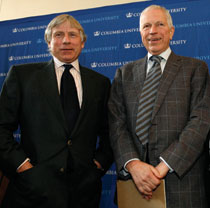|
|
 |
 |
|
AROUND THE QUADSPhelps, Pamuk Win NobelBy: Alex Sachare ’71

Edmund S. Phelps (right), the 2006 Nobel Prize winner in Economics, is joined by President Lee C. Bollinger at a news conference announcing the award. Photo: Diane Bondareff 
Edmund S. Phelps, the McVickar Professor of Political Economy and a Columbia faculty member for the past 35 years, and Turkish novelist Orhan Pamuk, a fellow with Columbia’s Committee on Global Thought who holds an appointment in Middle East and Asian Languages and Cultures and at the School of the Arts, won two of the six Nobel Prizes for 2006. Phelps was awarded the Nobel Prize in Economics on October 9 for his work explaining the relationship between inflation and unemployment. Three days later, Pamuk became the first Turkish writer to win a Nobel Prize in Literature; in the words of the Royal Swedish Academy, he “has discovered new symbols for the clash and interlacing of cultures.” President Lee C. Bollinger said, “We are delighted by the fact that our university is home to two new Nobel laureates in a single week.” The six Nobel Prize categories are medicine, chemistry, physics, economics, literature and peace. Phelps is the third Nobel laureate on Columbia’s economics faculty, alongside Robert Mundell and Joseph Stiglitz. The Royal Swedish Academy said Phelps, who directs the Earth Institute’s Center on Capitalism and Society, has had a “decisive impact on economic research as well as policy.” Phelps showed how the possibilities of stabilization policy in the future depend on today’s policy decisions; for example, low inflation today leads to expectations of low inflation in the future, thereby facilitating future policy making. Phelps challenged the accepted view from the 1960s that the price for reduced unemployment was a one-time increase in inflation, arguing that inflation depends on both unemployment and inflation expectations. Instead of looking at short-term tradeoffs between unemployment and prices, Phelps argues, policy makers should steer the economy toward employment levels that are optimal and sustainable across the long term. Pamuk has been publishing since 1972, and his work has been translated into more than 40 languages. An Istanbul native, he was a visiting scholar at Columbia from 1985–88; he began work on one of his best-known novels, The Black Book, in a small study in Butler Library. “My cubicle was above three million books and I was very happy there,” Pamuk said. Pamuk returned to Turkey, where his writing brought him worldwide acclaim and his political outspokenness led to criminal prosecution. Charges were brought against him last year for remarks he made concerning the Armenian genocide in the last days of the Ottoman Empire early in the 20th century, charges that were dropped in January 2006. He returned to Columbia to continue his work. “Pamuk is an exhilarating novelist who embodies world literature today in a double sense: All his narratives are deeply rooted in Turkish history, culture and society, but in their complex, yet engaging, mode of narration, they appropriate the best of the transnational modernist tradition,” said Andreas Huyssen, chair of the department of Germanic languages and literature and Villard Professor of German and Comparative Literature. “He richly deserves the Nobel Prize, and we at Columbia are extremely fortunate to be welcoming him as a contributor to our programs in comparative literature and global thought.” The Committee on Global Thought focuses on curricular and research initiatives designed to create global knowledge. The select faculty committee is chaired by Stiglitz, a 2001 Nobel Laureate and University Professor of Economics. The Nobel Prize, which is worth $1.37 million, will be presented in Stockholm on December 10. For more information, go to http://nobelprize.org.
|
|
||||||||||||||||||||||||||||




